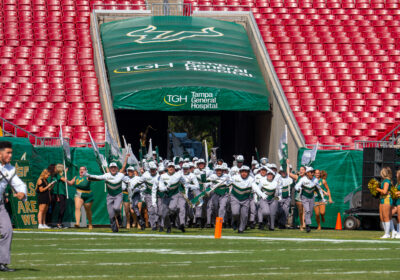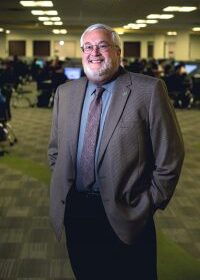A step in their shoes: the trans student community

Imagine living your whole life feeling uncomfortable in the body you were born with. Imagine, instead of anticipating the day your voice changed or your period came, dreading that day. For many transgender people, this nightmare is a daily reality.
USF’s Trans+ Student Union (TSU), is an organization created to combat the dysphoria and hatred experienced by the community of trans+ people, or those who identify as transgender or outside the traditional male or female gender. Not only is the group open to people of the trans community, but also their cisgender allies, or those who comfortably identify with the gender they were born.
Prin Luis, the former president and founder of TSU, began identifying as genderqueer like many people of the Internet age, through Tumblr, describing a very fluid identity.
“For me, since I’m genderqueer, I don’t feel like I have one specific gender,” Luis said. “Some days I feel really feminine and will dress more feminine, and other days I feel really masculine.”
For Lucas Aiden Wehle, a senior physical education major, the transition from female to male was foreshadowed early in his life.
“I’ve always known I was male my whole life,” Wehle said. “I can remember as far back as when I was 4 or 5 years old, I was always playing with male toys,
doing stereotypical male things. I guess I didn’t feel different at that age, it just felt natural. That’s who I was.”
As with many trans people, when puberty began to hit, Wehle’s dysphoria with his body began to set in.
“Growing up and being told, ‘This is who you are. This is what you do and you have to buy into all of these stereotypes,’ was a struggle,” Wehle said. “I was never into being with my sisters or doing what they did, but I definitely felt like I had to do what my parents told me to do because my family is very religious and very into image. So it was really a struggle.”
Luis experienced a similar feeling.
“Freshman year I had a lot of dysphoria and that’s when I started going by Prin,” Luis said.
Wehle started on hormones his freshman year and underwent “top surgery,” or the removal of breast tissue, in August of 2012. His transition is not stopping there.
“I do plan on having a hysterectomy soon, because I don’t need (a uterus). I do plan on having bottom surgery as well but only when they perfect it,” Wehle said. “I think medical technology is advancing, so I think there will be a lot of better options soon.”
Wehle said he has been out to his parents for five years, but things are very rough. They have not accepted him or his transition.
“I’m very close with my family, we are very close, but it is something I struggle with every day. They still misgender me or don’t use pronouns and use my birth name,” Wehle said. “It’s not even a thought, it’s not like they just mess up once in a while, it’s not even a thought for them. They’ve never used my name.”
“My dad has come a little way, he’s used my name maybe five times in the past five years and used my gender pronouns less than a handful of times,” Wehle said. “Coming out was really a struggle. Everything blew up. My older sister blew up on me. We don’t have a relationship at all.”
Last fall, Luis restarted TSU, a group that Wehle said had a very negative outlook on cis relations with the trans community. Instead of interacting with outside clubs and being welcoming to the cis community, the club seemed to dwell on the past. Now, he said, the club of about 30 members is extremely inclusive and active in the community.
“TSU has become a great organization. I think we are a place that no matter who has come into the room, everyone has felt like they could be themselves. We are a place everyone can feel comfortable,” Wehle said. “We’re a small organization but we are growing because of that. A lot of people have come and enjoyed themselves or learned something. And we’re small, but we’re close because of that. It’s all part of our family.”
Luis said the club is discussion-based and open to everyone. Their last topic of choice was positive trans representation, but discussions can range from broad to personal.
“There have definitely been a lot of people who come to meetings who aren’t out. They aren’t at the point in their lives to be out,” Luis said. “We encourage an open and loving dialogue welcoming both trans and cis allies. We are there to support them. We try to make the environment safe so that people feel comfortable enough to talk about their experiences.”
Wehle said he is very happy with the way TSU’s defining event, Trans Day of Remembrance (TDR), was executed last November. Alongside candle-light vigils, survivors and friends gave first-person accounts of their experiences as both trans people and allies.
“TDR is for people in our community who we’ve lost due to suicides. This year we had a great turnout,” Wehle said. “I honestly think it’s because we put it on ourselves. There were some really meaningful stories and performances.”
Wehle said what he wants the most from TSU is for people to educate themselves. He wants equal treatment.
“People don’t know how to talk to trans people. People don’t know how to treat us like we’re them. Nonbinary, binary, whatever you are, it doesn’t matter, we all live, eat and breathe the same things,” Wehle said. “What I like to say is, ‘Sometimes they let me out of my cage and I eat real food too,’ because that’s how I feel. I feel like that’s how people talk to me. I love being the go-to guy, but I want to have a conversation with my friends that doesn’t involve what’s in my pants.”
TSU holds their weekly meetings Tuesday nights at 7 in Marshall Student Center Room 2702.






